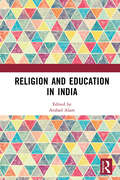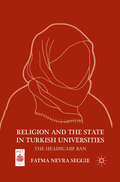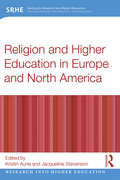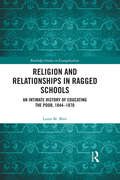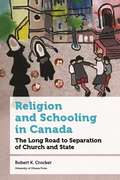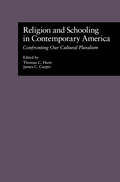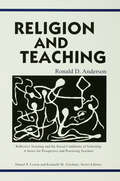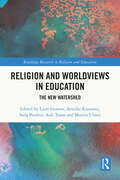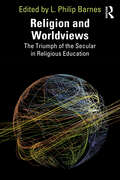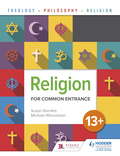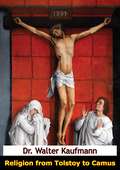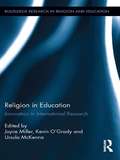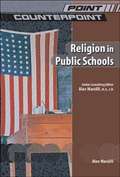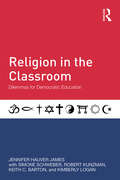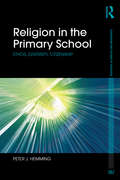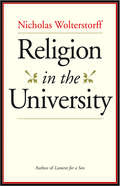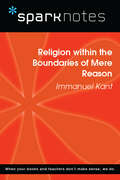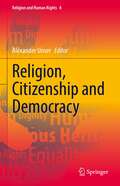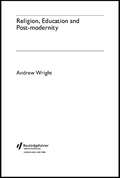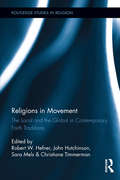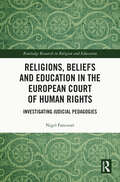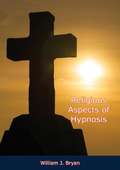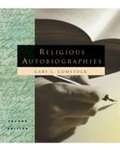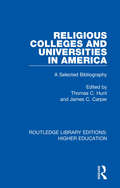- Table View
- List View
Religion and Education in India
by Arshad AlamThis book studies the relationship between religion and education in the Indian context. It analyses the creative interface between religion and education as empirical categories and overlapping modes of pedagogical transmission. The volume investigates the ways in which religious identities are shaped through education both at home and at school. It brings together academics and researchers working in different faith traditions like Islam, Hinduism, and Sikhism to understand the significance of transmitting religious education and the need to pay closer attention to sites through which religious instruction is being disseminated. Topical and lucid, this book will be an important reading for scholars and researchers of sociology, religious studies, secularism, sociology of education, political sociology, South Asia studies, and education in general.
Religion and Ethics in a Globalizing World: Conflict, Dialogue, and Transformation (Middle East Today)
by Luca Anceschi Joseph Anthony Camilleri Ruwan Palapathwala Andrew WickingThis book explores educational and cultural experiences of 'part-time' unveilers during their undergraduate degree programs in public institutions in Turkey. The term 'part-time unveiler' refers to undergraduate female students who cover their hair in their private lives but who remove the headscarf while at a Turkish university.
Religion and Freedom of Thought
by Reinhold Niebuhr Perry Miller Robert L. Calhoun Nathan M. Pusey Henry P. Van DusenWritings on this subject by scholars.
Religion and Higher Education in Europe and North America
by Kristin Aune Jacqueline StevensonReligion and Higher Education in Europe and North America illuminates the experiences of staff and students in higher education as they negotiate the university environment. Religious extremism has been rising across Europe, whilst recent attacks have thrown public debate around the place of religion on campus, the role of universities in recognising and managing religious fundamentalism and freedom of speech on campus into sharper focus. Despite these debates, research exploring religion on campus has been largely absent from discourse on higher education outside of America, with policy and practices designed to deal with religion on campus largely founded on supposition rather than evidence. This book speaks into that void, including results from recent studies in the field which form an empirically grounded base from a broad variety of perspectives on religion at universities. Aiming to offer a deeper perspective, more dialogue, and engagement on the experiences of students, Religion and Higher Education in Europe and North America presents us not only with an opportunity to counter growing trends of intolerance, but for people to connect with the humanity of others. Focusing on what research reveals about staff and students’ experiences, it incorporates research from different academic disciplines including sociology, education, social policy, theology and religious studies, and across different faith and belief groups. This thought-provoking and challenging volume features chapters written by researchers involved in informing policy and practice relating to religion and belief in higher education in the UK, US, Canada, France and the Netherlands . Spanning the academic-practitioner divide, students and academics interested in the sociology of religion and of higher education, as well as those responsible for the practical management of campus life, will find this text of particular importance.
Religion and Relationships in Ragged Schools: An Intimate History of Educating the Poor, 1844-1870 (Routledge Studies in Evangelicalism)
by Laura M. MairFocusing on the interaction between teachers and scholars, this book provides an intimate account of "ragged schools" that challenges existing scholarship on evangelical child-saving movements and Victorian philanthropy. With Lord Shaftesbury as their figurehead, these institutions provided a free education to impoverished children. The primary purpose of the schools, however, was the salvation of children’s souls. Using promotional literature and local school documents, this book contrasts the public portrayal of children and teachers with that found in practice. It draws upon evidence from schools in Scotland and England, giving insight into the achievements and challenges of individual institutions. An intimate account is constructed using the journals maintained by Martin Ware, the superintendent of a North London school, alongside a cache of letters that children sent him. This combination of personal and national perspectives adds nuance to the narratives often imposed upon historic philanthropic movements. Investigating how children responded to the evangelistic messages and educational opportunities ragged schools offered, this book will be of keen interest to historians of education, emigration, religion, as well as of the nineteenth century more broadly.
Religion and Schooling in Canada: The Long Road to Separation of Church and State (Education)
by Robert K. CrockerLes organisations chrétiennes ont toujours été impliquées dans l’éducation canadienne. En 1949, cinq provinces comptaient des écoles confessionnelles protégées par la Constitution. Le gouvernement fédéral a essentiellement confié sa responsabilité de l’éducation pour les peuples autochtones aux églises pour plus d’un siècle. Résultat : une histoire de mauvais traitements seulement mise au jour récemment.Des années 1950 aux années 1970, plusieurs mesures dans diverses provinces ont posé les jalons pour d’importantes réformes en éducation. Certaines testaient les limites des protections confessionnelles, mais ne pouvaient éliminer les structures constitutionnelles sous-jacentes.Le rapatriement de la Constitution et l’adoption de la Charte des droits et libertés en 1982 ont codifié des changements fondamentaux dans la perception des droits civils. La Charte permettait des remises en question des droits confessionnaux sur plusieurs fronts, mais elles ont toutes été refusées par les tribunaux au motif que la Charte ne peut servir à déroger à d’autres parties de la Constitution.Dans les années 1990, le mode de révision se présente comme une autre voie vers la réforme. On a recouru à des modifications constitutionnelles pour mettre fin au contrôle confessionnel des écoles à Terre-Neuve et au Québec en 1997 et en 1998.Les circonstances entourant ces modifications constitutionnelles sont scrutées comme précédents possibles pour obtenir des résultats semblables en Alberta, en Ontario et en Saskatchewan. Cet ouvrage soutient que des changements y sont inévitables et présente plusieurs voies vers la réforme. Cette réforme vise à éliminer la discrimination inhérente dans les établissements confessionnels tout en préservant une participation religieuse dans certaines écoles.
Religion and Schooling in Contemporary America: Confronting Our Cultural Pluralism (Source Books on Education #50)
by Thomas C. Hunt James C. CarperWith articles dealing with denomination, law, public policy and financing this anthology grants an evenhanded view of the impact of religion on our nation's public schools.
Religion and Teaching
by Ronald D. AndersonThis text engages preservice and practicing teachers in considering some of the complex issues related to religion and teaching that all educators face in their interactions with students, parents, administrators, and fellow teachers. The questions are not just about what is legal and what is not, but how a teacher should act in the best interests of all students, both those who are religious and those who are not. This book does not provide answers. Its goal is to cause readers to reflect deeply on issues related to their professional decisions and actions regarding religion and teaching. Religion and Teaching is pertinent for all prospective and practicing teachers at any stage in their teaching careers. It can be used in any undergraduate or graduate course that addresses issues of religion and teaching.
Religion and Worldviews in Education: The New Watershed (Routledge Research in Religion and Education)
by Liam Gearon Auli Toom Arniika Kuusisto Saila Poulter Martin UbaniThis timely book offers a critically important contribution to debates around the meeting place of religious and secular worldviews in education. Edited by five leading figures in the field, and drawing on expert international scholarship and research, the book provides cutting-edge analysis that bridges the religious and secular in global educational contexts. Considering the role of the United Nations, UNESCO, OECD and PISA in varied international contexts, the book draws on critical analysis of primary empirical research and secondary critique to offer a coherent blend of theoretically complex yet practical analysis of policy implementation. Throughout this accessible and logically structured volume, the authors assert that the meeting place of religious and secular worldviews is one of the most important and pressing issues for religion in education. As a field-defining work of research into education, religion and worldviews, the book will be essential reading for scholars, researchers and postgraduate students in the fields of religious education, religious studies, philosophy of education and international education.
Religion and Worldviews: The Triumph of the Secular in Religious Education
by L. Philip BarnesReligion and Worldviews: The Triumph of the Secular in Religious Education provides the first serious analysis and review of the Commission on Religious Education’s proposed worldviews framework for the subject. It argues that religious education has an important contribution to make to the aims of liberal education and examines whether the shift to a worldview framework is capable of overcoming current weaknesses and initiating a new positive direction for the future. Chapters explore the role of worldviews in Religious Education, covering key debates including: Whether there is need for new legislation on RE The nature of professionalism and the role of ‘experts’ The extent to which there is educational value in study of the personal worldviews of students The role of the religious voice in RE The relation of religions to religious worldviews The aims of RE The relationship between the state and religion Consideration of the nature of a worldview The personal reflections of a member of the Commission on its proposals. The chapters provide all that is necessary to understand and to evaluate the current debate on the appropriateness of a worldviews approach to RE. Bringing together leading names in the field, this is essential reading for trainee and practising teachers of Religious Education, RE advisers and schools’ leaders responsible for curriculum development.
Religion for Common Entrance 13+
by Michael Wilcockson Susan GrenfellTrust the experts; let Religious Studies specialists Susan Grenfell and Michael Wilcockson guide you through the new World Religions content of the 2018 ISEB Theology, Philosophy and Religion syllabus for Common Entrance 13+.- Enables students to develop and review their knowledge through discussion points and a variety of activities designed to encourage active research and engagement- Builds the skills that students need for the exam by providing questions that focus on the three assessment objectives- Boosts students' confidence approaching assessment with exam-style practice questions at the end of each section- Offers a flexible route through the new syllabus with clear coverage of all six world religionsThis Student Book is fully supported by the accompanying Teacher Resource Book, which contains helpful Teachers' Overviews for each chapter, guidance on delivering the content and classroom-ready worksheets.
Religion from Tolstoy to Camus
by Walter KaufmannFirst published in 1961, this volume brings together basic writings and religious truths and morals from a wide range of sources.Tolstoy, Dostoevsky, Plus II, Leo XIII, Nietzsche, James, Royce, Wilde, Freud, Niemöller, Barth, Maritain, Tillich, Schweitzer, Buber, Camus, and others, all have sought the religious truth about man, and have in the last three quarters of our century made great contributions to religious thought, critical often of the accepted and fashionable religion of their day, but greatly concerned to purify religion as they understood it.Dr. Waller Kaufman, of Princeton University, who has already written extensively on philosophy and religion, supplies an editorial and critical note for each of his subject, thus providing valuable continuity and evaluation.Such a book as this deserves a place in all libraries, public and private, so that it will be possible to quote these men from knowledge, rather than hearsay many times removed from the original.“The point is not to win friends for religion, or enemies, but to provoke greater thoughtfulness. Here are texts that deserve to be pondered and discussed. Some of them I have criticized in other volumes; in such cases, the references are given. But in the present book nothing is included merely to be disparaged, nor is anything offered only to be praised. The hope is that those who read this book will gain a deeper understanding of religion.”—Walter Kaufmann, Preface
Religion in Education: Innovation in International Research (Routledge Research in Religion and Education)
by Joyce Miller Kevin O’Grady Ursula McKennaThis volume explores numerous themes (including the influence of ethnography on religious education research and pedagogy, the interpretive approach to religious education, the relationship between research and classroom practice in religious education), providing a critique of contemporary religious education and exploring the implications of this critique for initial and continuing teacher education.
Religion in Public Schools (Point Counterpoint)
by Alan MarzilliThis book debates whether or not children be permitted to express their faith in public schools.
Religion in the Classroom: Dilemmas for Democratic Education
by Kimberly Logan Keith C. Barton Jennifer Hauver James Simone Schweber Robert KunzmanDilemmas surrounding the role for religious beliefs and experiences permeate the school lives of teachers and teacher educators. Inspired by the need for teachers and students to more fully understand such dilemmas, this book examines the relationship between religion and teaching/learning in a democratic society. Written for pre-service and in-service teachers, it will engage readers in thinking about how their own religious backgrounds affect their teaching; how students’ religious backgrounds influence their learning; how common experiences of school and classroom life privilege some religions at the expense of others; and how students can better understand diverse religious beliefs and interact with people from other backgrounds. The focus is specifically on classroom issues related to religious understandings and experiences of teachers and students, and the implications of those for developing democratic citizens. Grounded in both research and personal experience, each chapter provides thought-provoking evidence related to the role of religion in schools and society and asks readers to consider the consequences of varied ways of responding to the dilemmas posed.
Religion in the Primary School: Ethos, diversity, citizenship (Foundations and Futures of Education)
by Peter HemmingReligion and its relationship to schooling is an issue that has become more and more topical in recent years. In many countries, developments such as the diversification of state school sectors, concerns about social cohesion between ethnic and religious groups, and debates about national identity and values have raised old and new questions about the role of religion in education. Whilst the significance of this issue has been reflected in renewed interest from the academic community, much of this work has continued to be based around theoretical or pedagogical debates and stances, rather than evidence-based empirical research. This book aims to address this gap by exploring the social and political role of religion in the context of the primary school. Drawing on original ethnographic research with a child-centred orientation, comparisons are drawn between Community and Roman Catholic primary schools situated within a multi-faith urban area in the UK. In doing so, the study explores a number of ways in which religion has the potential to contribute to everyday school life, including through school ethos and values, inter-pupil relations, community cohesion and social identity and difference. At the centre of the analysis are two key sociological debates about the significance of religion in late modern societies. The first is concerned with the place of religion in public life and the influence of secularisation and post-secularism on the relationship between religion and schooling. The second relates to the increasingly multi-faith nature of many national populations and the implications for religious citizenship in educational settings. Religion in the Primary School will be a useful resource for academics, researchers and students as a key addition to existing knowledge in the disciplines of education, sociology and human geography. It will also be of value to both policy-makers and educationalists interested in the role of religion in schools and the implications for the wider community and society in a range of national contexts.
Religion in the University
by Nicholas WolterstorffFrom one of the world’s leading philosophers, this is a powerful defense of religion’s role within the modern university What is religion’s place within the academy today? Are the perspectives of religious believers acceptable in an academic setting? In this lucid and penetrating essay, Nicholas Wolterstorff ranges from Max Weber and John Locke to Ludwig Wittgenstein and Charles Taylor to argue that religious orientations and voices do have a home in the modern university, and he offers a sketch of what that home should be like. He documents the remarkable changes have occurred within the academy over the past five decades with regard to how knowledge is understood. During the same period, profound philosophical advancements have also been made in our understanding of religious belief. These shifting ideals, taken together, have created an environment that is more pluralistic than secular. Tapping into larger debates on freedom of expression and intellectual diversity, Wolterstorff believes a scholarly ethic should guard us against becoming, in Weber’s words, “specialists without spirit and sensualists without heart.”
Religion within the Boundaries of Mere Reason (SparkNotes Philosophy Guide)
by SparkNotesReligion within the Boundaries of Mere Reason (SparkNotes Philosophy Guide) Making the reading experience fun! SparkNotes Philosophy Guides are one-stop guides to the great works of philosophy–masterpieces that stand at the foundations of Western thought. Inside each Philosophy Guide you&’ll find insightful overviews of great philosophical works of the Western world.
Religion, Citizenship and Democracy (Religion and Human Rights #8)
by Alexander UnserThis innovative volume is focused on the impact of religion on the realization of democratic citizenship. The researchers contributing provide empirical evidence on how religion influences attitudes towards citizenship and democracy in different countries. The book also tackles the challenges and opportunities for citizenship education. Experts contributing from sociology, political science, theology, and educational science look at the impact of religious beliefs and practices on democratic attitudes and behavior. Chapters also concern how religion influences the recognition of others as citizens. The text appeals to graduates and researchers in these fields with a secondary market for the general interest reader.
Religion, Education and Post-Modernity
by Andrew WrightThis book, the first to explore religious education and post-modernity in depth, sets out to provide a much needed examination of the problems and possibilities post-modernity raises for religious education.At once a general introduction to this topic and a distinctive contribution to the debate in its own right, Religion, Education and Post-modernity explores and illuminates the problems, and possibilities opened up for religious education by postmodern thought and culture. The book describes the emergence of post-modernity, considers the impact of post-modernity on religion, addresses its impact on the philosophy of religion and considers the nature of religious education in the post-modern world.Andrew Wright argues that, although post-modernity has much to offer the religious educator, there are also many pitfalls and dangers to be avoided. Steering clear of the extreme of post-modern hyper-realism, he constructs a religious pedagogy sensitive to post-modern concerns for alterity, difference and the voice of the Other, whilst insisting on the importance of reasons in cultivating religious literacy.
Religions in Movement: The Local and the Global in Contemporary Faith Traditions (Routledge Studies in Religion #27)
by Robert W. Hefner Christiane Timmerman John Hutchinson Sara MelsThere has long been a debate about implications of globalization for the survival of the world of sovereign nation-states, and the role of nationalism as both an agent of and a response to globalization. In contrast, until recently there has been much less debate about the fate of religion. ‘Globalization’ has been viewed as part of the rationalization process, which has already relegated religion to the dustbin of history, just as it threatens the nation, as the world moves toward a cosmopolitan ethics and politics. The chapters in this book, however, make the case for the salience and resilience of religion, often in conjunction with nationalism, in the contemporary world in several ways. This book highlights the diverse ways in which religions first and foremost make use of the traditional power and communication channels available to them, like strategies of conversion, the preservation of traditional value systems, and the intertwining of religious and political power. Nevertheless, challenged by a more culturally and religiously diversified societies and by the growth of new religious sects, contemporary religions are also forced to let go of these well known strategies of preservation and formulate new ways of establishing their position in local contexts. This collection of essays by established and emerging scholars brings together theory-driven and empirically-based research and case-studies about the global and bottom-up strategies of religions and religious traditions in Europe and beyond to rethink their positions in their local communities and in the world.
Religions, Beliefs and Education in the European Court of Human Rights: Investigating Judicial Pedagogies (Routledge Research in Religion and Education)
by Nigel FancourtThe Routledge Research in Religion and Education series aims at advancing public understanding and dialogue on issues at the intersections of religion and education. These issues emerge in various venues and proposals are invited from work in any such arena: public or private education at elementary, secondary, or higher education institutions; non-school or community organizations and settings; and formal or informal organizations or groups with religion or spirituality as an integral part of their work. Book proposals are invited from diverse methodological approaches and theoretical and ideological perspectives. This series does not address the work of formal religious institutions including churches, synagogues, mosques, and temples. Rather, it focuses on the beliefs and values arising from all traditions as they come into contact with educational work in the public square. Please send proposals to Mike Waggoner (mike.waggoner@uni.edu) and Alice Salt (alice.salt@tandf.co.uk).
Religious Aspects of Hypnosis
by William J. BryanA unique book—the first to discuss fully religious aspects of hypnosis…- How religion utilizes hypnosis to achieve its end- How medical hypnotists may use religious principles in the analytic treatment of their patients.
Religious Autobiographies
by Gary L. Comstock C. Wayne MayhillThis unique anthology, now with contributing editor C. Wayne Mayhall, includes spiritual autobiographies of both men and women from a variety of religious traditions within a multicultural context. It presents religion as a "lived experience" and helps students think empathetically about religious experiences in a wide variety of cultural and religious settings.
Religious Colleges and Universities in America: A Selected Bibliography (Routledge Library Editions: Higher Education #11)
by Thomas Hunt James CarperOriginally published in 1988 Religious Higher Education in the United States is a selected bibliography of sources addressing how religion has changed and affected education in the United States. This volume attempts to address the problems currently facing religious institutions of higher education, covering government aid and the regulation of religious colleges and universities in the US.
